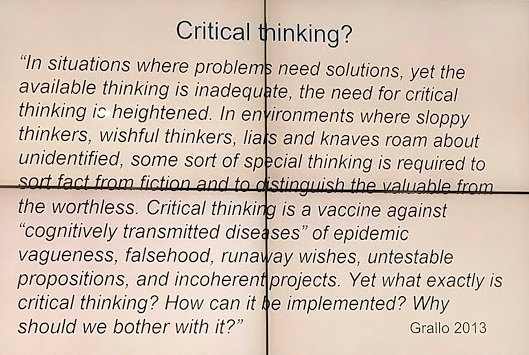One highlight from the week just gone was the most recent ResearchEd Australia conference. It's been 2 years between drinks… far too long if you ask me! I share some of my (brief) takeaways in T1.
T2 is a must listen podcast and accompanies well another podcast by Emily Hanford which I shared here in TOT065.
T3 is a fantastic resource. Content rich curricula, freely downloadable! Check it!
T4 is for our friends in the northern hemisphere. A podcast detailing how 30 different teachers run their first lesson with a new class. Plenty of food for thought.
I'll let the other takeaways speak for themselves, only to point out that T10 shares some really positive news about some of the impact that the ERRR podcast is starting to have. Very exciting to think that the ERRR is causing system-level change and helping to drive evidence informed practice.
Hope you had a great week.
Enjoy : )
If you'd like to support Teacher Ollie's Takeaways and the Education Research Reading Room podcast, please check out the ERRR Patreon page to explore this option. Any donation, even $1 per month, is greatly appreciated.
(all past TOTs here), sign up to get these articles emailed to you each week here.
Some quick takeaways from @researchED_Aus Melbourne
Thoroughly enjoyed ResearchEd last Saturday at Brighton Grammar. Two talks in particular stood out to me…
I particularly enjoyed the opening keynote from David de Carvalho, CEO of the Australian Curriculum, Assessment and Reporting Authority (ACARA). David spoke about a whole host of issues, but what most struck me was his clear understanding of the link between knowledge and skills. David referenced an interesting sounding book, ‘Insight'(1958) by Bernard Lonergan, a thinker of whom I hadn't heard before. Here's one of David's stimulating slides…
I also very much enjoyed the presentation by Lyn Stone (@lifelonglit) who gave a great overview of some of the principles of reading and writing instruction (beware any ‘strategy' which takes students' focus away from the printed words that they're trying to decode), pointed attendees to the podcast which is T2 in this week's TOT, praised the book ‘The Writing Revolution' by Judith Hochman (I interviewed Judith about her book for the ERRR podcast, which you can listen to here), and reminded me that I should read ‘Essentials of Assessing, Preventing, and Overcoming Reading Difficulties' by David Kilpatrick.
Probably the highlight for me was hearing Reid Smith (@smithre5) from Ballarat Clarendon College talk about using variation to systematically identify weak points in instruction, share best practice, and improve curriculum materials for next year (feedback vs. feed-forward). Reid shared a well structured and well thought out process that made a lot of sense.
I was upset that I missed the sessions of Benjamin Evans (@thingsbehindsun) and Mark Dowley, I heard their presentations were great too.
How a flawed idea is teaching millions to be poor readers, via @ehanford and @apmreport
‘At a Loss for Words: How a flawed idea is teaching millions of kids to be poor readers'. Can't recommend this podcast highly enough. Fascinating exploration of how the three cuing method causes harm. Via @ehanford
And @apmreport Ht @lifelonglithttps://t.co/0DXHqdqduu— Oliver Lovell (@ollie_lovell) August 25, 2019
The ‘Core Knowledge Society', free, high quality, curriculum resources, via @ckschools
Oh my goodness. I just discovered the Core Knowledge Society (@ckschools) via @natwexler‘s book ‘The Knowledge Gap'. This organisation is incredible. They have freely downloadable, content rich, curricula, complete with detailed teacher guides. GOLDMINE!!! https://t.co/MB4Rlf4xgP
— Oliver Lovell (@ollie_lovell) August 27, 2019
What does your first lesson look like? Via @mrbartonmaths
?️BACK TO SCHOOL?️
This time last year I asked 30 teachers what their first lesson with a new class looks like.
This episode is rammed full of insights and ideas ??https://t.co/3TxfAdPQtQ
— Craig Barton (@mrbartonmaths) August 27, 2019
How can we attract high achievers to teaching? Via @grattaninst
Great podcast from @GrattanInst
With some pragmatic and practical approaches to attracting high achievers to the teaching profession. https://t.co/FPS0bPxOuy— Oliver Lovell (@ollie_lovell) August 27, 2019
Teaching middle-schoolers about their emotions during transition can have positive outcomes ht @dylanwiliam
Teaching US middle-schoolers that feelings of anxiety and lack of belonging are common, short-lived, and due to external, temporary causes, improved attendance, behavior and academic achievement: https://t.co/ADIqbDf4TY
— Dylan Wiliam (@dylanwiliam) August 24, 2019
Props to those who were willing to have their Ed programs independently evaluation, via @mattdeeble
‘Climbing the pyramid to get a better view'. @mattdeeble makes a good point in this article by highlighting the courage of the first few program developers who were willing to have their initiatives independently evaluated by @E4Ltweets. Ht @tomacain. https://t.co/df18L5BMS6
— Oliver Lovell (@ollie_lovell) August 18, 2019
Fantastic demo of ‘Inertia'
Brilliant demonstration of Newton’s principle of inertia. pic.twitter.com/5xQKSYIYOV
— Lionel Page (@page_eco) August 24, 2019
Maths joke: Incorrectly cancelling top and bottom of fraction
When you have no idea how to work a problem on a math test pic.twitter.com/cRPoliHSWo
— College Student (@ColIegeStudent) October 11, 2014
A big win for the ERRR podcast!
Today I found out that a director of a state catholic ed department in Australia, after hearing my ERRR podcast discussion with @DrLSHammond, is now working hard to roll out effective literacy instruction within his sector. STOKED! You can listen here: https://t.co/0215GCch2D
— Oliver Lovell (@ollie_lovell) August 14, 2019
